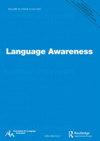说话者种族的假设及其对口音、可理解性和可理解性评分的影响
IF 2.2
2区 文学
0 LANGUAGE & LINGUISTICS
引用次数: 0
摘要
摘要虽然听众认为说话者来自不同的语言群体时,往往会降低他们的口音和可理解性,这一过程被称为反向语言刻板印象(RLS),但研究通常只依赖于Likert量表等定量数据。目前的研究试图通过调查评分者做出决定的原因来进一步扩展分析。210名日本大学生(六组n = 35)被要求听以日语为母语的人录制的演讲。在一个匹配的伪装设计中,两组人要么被展示了一名日本人、高加索人或东南亚男性的照片,并被要求提供重音、可理解性和可理解性的评分。然后,他们被要求报告哪些因素影响了他们的可理解性评级。与之前的研究一致,听众认为非日语伪装的口音明显高于日语伪装,尽管可懂度的差异并不显著。一个关键发现是,虽然可理解性评级在统计上具有可比性,但给出的理由在质量上有所不同。观看高加索或东南亚照片的组比日本组更多地提到发音问题,日本组报告语法和词汇因素是他们评级下降的原因。本文章由计算机程序翻译,如有差异,请以英文原文为准。
Assumptions of speaker ethnicity and the effect on ratings of accentedness, comprehensibility, and intelligibility
Abstract While listeners tend to downgrade speakers’ accent and comprehensibility when they perceive them to be from a different language community—a process known as reverse linguistic stereotyping (RLS)—research has generally relied solely on quantitative data such as Likert scale ratings. The current study sought to extend the analysis further by investigating the reasons which informed raters’ decisions. A sample of 210 Japanese university students (six groups of n = 35) were asked to listen to recorded speeches by native Japanese speakers. In a matched-guise design, the groups were either shown photos of a Japanese, Caucasian, or Southeast Asian male, and asked to provide ratings of accentedness, comprehensibility, and intelligibility. They were then asked to report what factors influenced their comprehensibility ratings. In line with previous research, listeners rated non-Japanese guises as significantly more accented than the Japanese one, though differences in intelligibility were non-significant. A key finding was that while comprehensibility ratings were statistically comparable, the rationales given were qualitatively different. Groups who viewed the Caucasian or Southeast Asian photographs cited pronunciation issues significantly more than the Japanese group which reported grammatical and lexical factors as the reasons behind their downgraded ratings.
求助全文
通过发布文献求助,成功后即可免费获取论文全文。
去求助
来源期刊

Language Awareness
Multiple-
CiteScore
3.70
自引率
10.00%
发文量
18
期刊介绍:
Language Awareness encourages and disseminates work which explores the following: the role of explicit knowledge about language in the process of language learning; the role that such explicit knowledge about language plays in language teaching and how such knowledge can best be mediated by teachers; the role of explicit knowledge about language in language use: e.g. sensitivity to bias in language, manipulative aspects of language, literary use of language. It is also a goal of Language Awareness to encourage the establishment of bridges between the language sciences and other disciplines within or outside educational contexts.
 求助内容:
求助内容: 应助结果提醒方式:
应助结果提醒方式:


